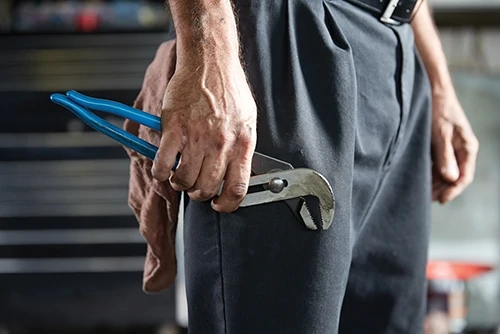Anyone who has spoken to a professional tradesman or woman has undoubtedly heard the phrase, “Take good care of your tools and they’ll take good care of you.” No matter what kind of tools you have, it’s the single best piece of advice one can follow. After all, no matter how well-built a tool is, it won’t last long if it’s carelessly used.
But how do you make sure you’re taking good care of your tools? Here are several tips from CHANNELLOCK®, which has been the maker of quality tools, like its original tongue and groove pliers, for 129 years. Apply these tips to your own workshop and chances are you will be able to pass down your trusted hammers and CHANNELLOCK® tools to the next generation.
- Always use the right tool for the job. Using the wrong tool, or using tools inappropriately, is a danger to yourself and others.
- Dust attracts moisture. To avoid rust, store tools in a dry place. If they get wet or you have to use them in the rain, wipe them dry and spray with a product like WD-40® afterward to make sure they stay rust-free. If there are signs of rust, apply WD-40® and then scrub the tools with a heavy-duty scouring pad or steel wool. Avoid using sandpaper, which can scratch the metal and any protective layers it may have.
- Don’t use damaged or dull tools. Worn or broken tools are a safety hazard and should be thrown away or recycled.
- Keep your tools organized. A tool box or chest is a great way to store tools as well as keep them organized, clean and easy to find. When you can’t find the tool you’re looking for, you end up using the wrong tool for the job.
- Don’t expose your tools to excessive heat and cold. Extreme temperatures can have adverse effects on metal tools.
- Don’t carelessly or intentionally drop your tools onto hard or paved surfaces. Even though they’re made of steel or metal, they still can break.
- Keep tools clean. Dust, dirt or grime can build up on tools and prevent them from working properly.
- And, finally, choose quality over quantity. While it may seem that sometimes saving a few dollars in the short term might be a good idea, often it is not. The higher the quality of a tool, the better it will perform and the longer it will last. Over time you will have fewer tools to replace and ultimately will save money and trips to the local retailer. Simply put, it makes more sense to invest in quality tools once, rather than to purchase lower-quality tools again and again.
All tools will get dirty and they should. The only way to keep tools perfectly clean is to never use them. But with proper care and maintenance, your tools will work every time and will last a lot longer.



